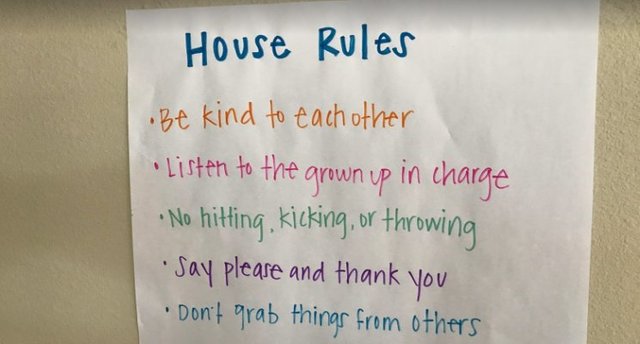HOUSE RULES @ your Company
Hello my Fellow Steemians!
Happy Friday to all of you!
In today’s increasingly toxic political and social environment, where personal insults and character assassination often seem to win out over intelligent discussion, sharing of ideas, and compromise, there was something about the common-sense wisdom in these simple rules that I found deeply appealing.
These are the five rules I saw posted in a family friend’s house for their three young boys (age 5 and under), who are quite energetic:
Be kind to each other
Listen to the grown-up in charge
No hitting, kicking, or throwing
Say please and thank you
Don’t grab things from others
It also occurred to me that many businesses operate without ever formalizing the rules of civil behavior that they expect of their employees – from frontline, customer-facing folks all the way up to senior executives. And today civil behavior is more critical than ever to business success, because collaboration and collegiality are at the heart of every information-rich, highly connected organization.
Rather than rules, at most companies the state of “civility” required within the organization is purely a function of the tone set at the very top of the hierarchy. But let’s face it: Many senior executives willingly tolerate jerks and bullies in their organizations as long as the numbers are being met.
If I were designing some guidelines to encourage civil behavior and better collaboration in a company, my very first House Rule would be:
Assume good intentions in others
What this rule elegantly does is codify the fact that human empathy is perhaps the single most valuable quality for any organization that wants to get things done and operate efficiently over the long term, particularly in the modern era.
Empathy is involved because before you can attribute good intentions to someone else, you first have to imagine yourself also having those intentions (and your intentions are always good, right?). You can only assume good intentions in someone else by putting yourself in that person’s shoes. But this is harder than it sounds, because the easiest way to confirm your own good intentions (to yourself) is to assume that those who disagree with you must be disagreeing because they have bad intentions. Which is why so many of us do that.
Here are a few other examples to consider:
Seek to balance the interests of all your company’s stakeholders, including not just shareholders, but customers, distributors, employees, creditors, and others.
Don’t tolerate gender, ethnic, or religious bias.
Using your power or authority over others for personal gain is never acceptable.
If you know someone else is acting unethically or violating the House Rules and you don’t act to prevent it, then you are just as guilty as they are.
But what are some other “House Rules” that govern ethical behavior and decision-making discussions at your own company? Or what suggestions for such rules would you have?

@ering has voted on behalf of @minnowpond.
If you would like to recieve upvotes from minnowponds team on all your posts, simply FOLLOW @minnowpond.
thanks!